牛津英语上海版六年级下册6B Module 2 Unit 10 Forests and land 4课时教案附反思
牛津上海版六下《Unit 10 Forests and land》ppt课件
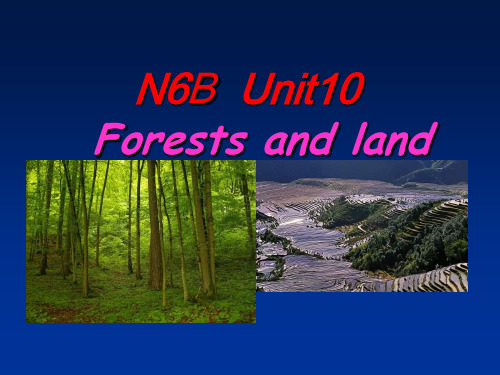
14. die------dead--------death
e.g. His grandfather ______ 10 years ago. His ______ made me sad.
He has been ______ for 10 years.
15. leaf-------leaves 树叶(复数) e.g. I saw a lot of ______ after a heavy rain.
4. prepare… for …=get…ready for… 为…准备… 5. three quarters =three-fourths 四分之三 6. one of +the +最高级+名词复数 “最…之一” one of the most intelligent animals 7. get…from…从 … 得到… 8. in the deep sea 9. be important to sb/sth 对…重要的 10. keep…clean 11. stop polluting oceans
7. important------importance 8. different-------difference 9. build-----building---builder 10. wool------woollen e.g. This is a ________ shirt.
11. wood-------wooden
New Lessons – Key words
2.in the trees (外界飞入的)树丛中 on the trees 长在树上的(叶,花,果)
eg: 1) Make nests______trees. 2) The birds are singing____the trees. 3) We can see apples_____the trees. 4) There are a lot of green leaves______ the trees.
(完整版)上海版牛津英语六年级下册6B重点知识点复习整理(最新整理)

(完整版)上海版牛津英语六年级下册6B重点知识点复习整理(最新整理)上海版牛津英语六年级下册6B重点知识点复习整理Module 1 City LifeUnit 1 Great cities in Asia【知识点梳理】1.方位词:east / west / north / south / north-east / north-west / south-east / south-west用法:a. 两地不相邻: e.g. A is north B. (= to the south of)b. 两地接壤: e.g. A is on the north of B.c. 所属关系,A包含B, B属于A: e.g. B is in the north of A.2. by + 交通工具表示“乘……交通工具”, 用how进行提问e.g. by bus / ferry / train / ship / underground… by plane = by air, by ship = by sea3. How far…多远(询问距离的远近,路程的长短)e.g. Hoe far is it from your home to school? 从你家到学校有多远?4. How long…多长,多久(询问时间的长短,提问一段时间)e.g. How long does it take to travel from Shanghai to Beijing by train? 坐火车从上海到北京要花多长时间?5. It takes (sb.) some time to do sth. 做某事需要花费多少时间e.g. It takes me five hours to make this modal plane. 做这个模型飞机花了我5个小时。
6. like / love / enjoy doing sth. 喜欢做某事e.g. The people in Bangkok like / love / enjoy eating spicy food. 曼谷人喜欢吃辛辣食物。
最新牛津上海版六年级下册《unit 10 forests and land》教案.doc
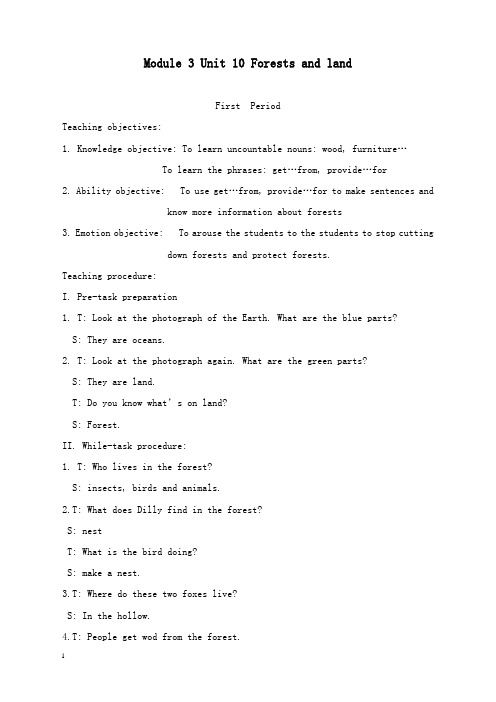
Module 3 Unit 10 Forests and landFirst PeriodTeaching objectives:1. Knowledge objective: To learn uncountable nouns: wood, furniture…To learn the phrases: get…from, provide…for2. Ability objective: To use get…from, provide…for to make sentences andknow more information about forests3. Emotion objective: To arouse the students to the students to stop cuttingdown forests and protect forests.Teaching procedure:I. Pre-task preparation1. T: Look at the photograph of the Earth. What are the blue parts?S: They are oceans.2. T: Look at the photograph again. What are the green parts?S: They are land.T: Do you know what’s on land?S: Forest.II. While-task procedure:1. T: Who lives in the forest?S: insects, birds and animals.2.T: What does Dilly find in the forest?S: nestT: What is the bird doing?S: make a nest.3.T: Where do these two foxes live?S: In the hollow.4.T: People get wod from the forest.People cut down trees.What do people use wood to do?S: make a fire, make paper, make furniture, make houses5.Look and read6.Answer questions7.Look,read and writeIII.Post-task activities:Think and say: What will happen if there are no forests?IV.Consolidation:1. Read and recite the new works2. Workbook 6B, page 663. Recite ‘Listen and read’Second PeriodTeaching objectives:1. Knowledge objective: To learn get…from, use…to make2. Ability objective: To use get…from, use…to make sentences3. Emotion objective: To arouse the students to protect the environment Teavhing procedure:I.Pre-task preparation:1. Answer true/ false2. Read and writeII.While-task procedure1. Look and learn2. Match the two columns and make sentences3. Listen and sayIII. Post-task activities1. Think and talk2. Do a surveyIV. Consolidation:1. Read and recite the new words2. Workbook 6B, pages 62 and 633. Recite ‘Listen and say’Third PeriodTeaching objectives:1. Knowledge objective: To learn get…from, use…to make2. Ability objective: To use get…from, use…to make sentences3. Emotion objective: To arouse the students to protect the environment Teaching procedure:I. Pre-task preparation1. Look, think and sayII. While-task procedure1. Think and write2. Look and learn3. Ask and answer4. Match and writeIII. Post-task activities1. Find out2. Think and writeIV. ConsolidationWorkbook 6B, page 67Fourth Period1. Knowledge objective: To learn be made of, It is+adj, It is… a adj. +n.2. Ability objective: To use be made of, It is+adj, It is… a adj. +n.tomake sentences3. Emotion objective: To arouse the students to protect the environment Teaching procedure:I.Pre-task preparation1. Ask and answer2. Read and writeII. While-task procedure:1. Touch,think and say2. Look and learn3. Play a game4. Feel and guess5. Ask, answer and write6. Think and talkIII. Post-task activities:Think and talkIV. Consolidation1. Read and recite p742. Workbook 6B, page 68。
牛津上海版英语六年级下册 Unit10 单元测试 有答案,无听力
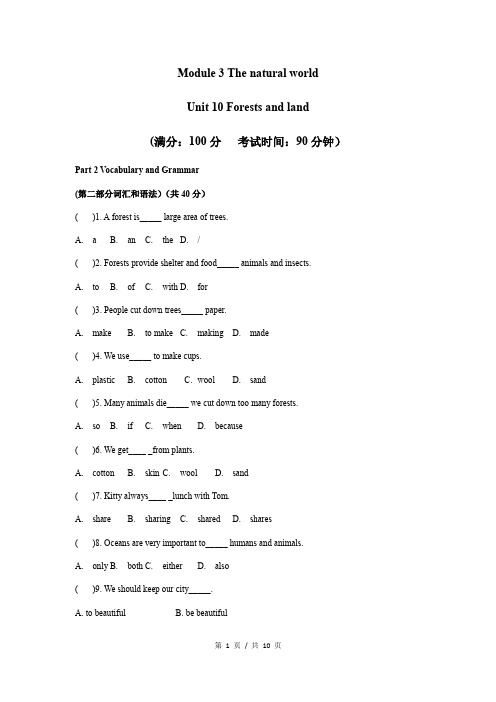
Module 3 The natural worldUnit 10 Forests and land(满分:100分考试时间:90分钟)Part 2 Vocabulary and Grammar(第二部分词汇和语法)(共40分)()1. A forest is_____ large area of trees.A.aB.anC.theD./()2. Forests provide shelter and food_____ animals and insects.A.toB.ofC.withD.for()3. People cut down trees_____ paper.A.makeB.to makeC.makingD.made()4. We use_____ to make cups.A.plasticB.cottonC.woolD.sand()5. Many animals die_____ we cut down too many forests.A.soB.ifC.whenD.because()6. We get____ _from plants.A.cottonB.skinC.woolD.sand()7. Kitty always____ _lunch with Tom.A.shareB.sharingC.sharedD.shares()8. Oceans are very important to_____ humans and animals.A.onlyB.bothC.eitherD.also()9. We should keep our city_____.A. to beautifulB. be beautifulC. beautifulD. being beautiful()10. Children can keep healthy_____ too much meat.A.with not eatingB. not by eatingC.not with eatingD. by not eating()11. The desks in our classroom are_____ wood.A. make ofB. made ofC. make fromD. made from()12. —_____does it feel?—It’s soft.A.WhatB. WhereC. WhenD. How()13. People must stop _____the Earth.A. pollutingB. polluteC. pollutesD. to pollute()14. We can get plastic from_____.A.woolB. oilC. clayD. cotton()15. Some insects build their homes_____ trees.A. in the hollowsB. in the hollowC. in the hollows ofD. in the hollow ofII. Complete the sentences with the given words in their proper forms (用括号内所给单词的适当形式完成下列句子):(共6分)1.How many_____are there on your farm? (sheep)2.Can you help me move this______chair? (wood)3.Paper is one of the four great inventions which is really_______. (use)4.YouM better stay at home. It’s raining______. (heavy)5.Stop______fried chicken wings because you are too fat. (eat)6.Liu was the______to reach the finishing line in the 100-metre race, (one)III. Rewrite the following sentences as required(根据所给要求,改写下列句子。
新沪教牛津版六年级下册小学英语全册单元知识点小结
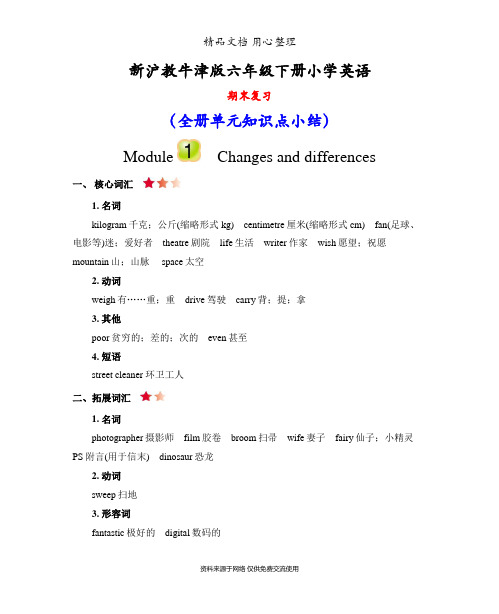
新沪教牛津版六年级下册小学英语期末复习(全册单元知识点小结)Module Changes and differences一、核心词汇1. 名词kilogram千克;公斤(缩略形式kg)centimetre厘米(缩略形式cm)fan(足球、电影等)迷;爱好者theatre剧院life生活writer作家wish愿望;祝愿mountain山;山脉space太空2. 动词weigh有……重;重drive驾驶carry背;提;拿3. 其他poor贫穷的;差的;次的even甚至4. 短语street cleaner 环卫工人二、拓展词汇1. 名词photographer摄影师film胶卷broom扫帚wife妻子fairy仙子;小精灵PS附言(用于信末)dinosaur恐龙2. 动词sweep扫地3. 形容词fantastic极好的digital数码的4. 副词online在线地;在线的5. 代词themselves他们自己;她们自己;它们自己6. 其他taller更高的7. 短语go fishing去钓鱼enjoy oneself玩得愉快;得到乐趣get … in收割street sweeper扫地车by hand用手right away立即;马上in a short time很快head teacher 校长 a piece of一张;一片have a picnic去野餐better and better越来越好三、核心句型1. I’m 150 centimetres tall. 我身高150厘米。
解读:这是介绍身高的句型。
“主语 + be动词 + 数字 + 长度单位(+ tall).”可以用来介绍某人的身高。
举一反三: My cousin is 154 centimetres tall. 我的堂弟身高154厘米。
Jim is 149 centimetres tall. 吉姆身高149厘米。
2. There are a lot of tall buildings in the city. 城市里有很多高大的建筑物。
上海牛津英语六年级下册期末复习Revision-for-6B--用所给词的适当形式填空
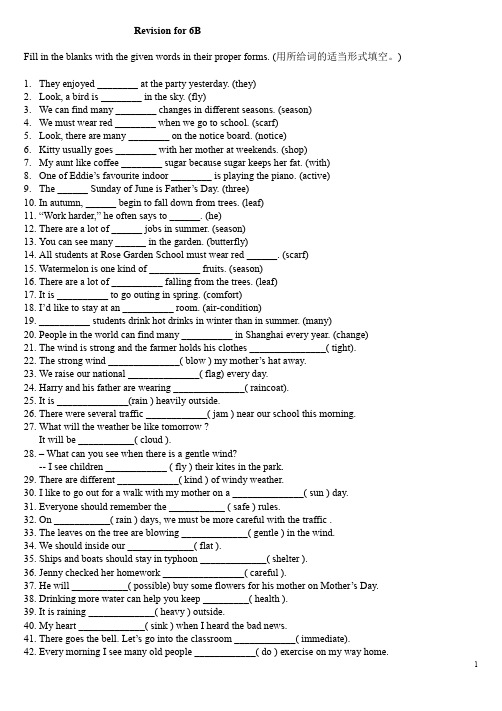
Revision for 6BFill in the blanks with the given words in their proper forms. (用所给词的适当形式填空。
)1.They enjoyed ________ at the party yesterday. (they)2.Look, a bird is ________ in the sky. (fly)3.We can find many ________ changes in different seasons. (season)4.We must wear red ________ when we go to school. (scarf)5.Look, there are many ________ on the notice board. (notice)6.Kitty usually goes ________ with her mother at weekends. (shop)7.My aunt like coffee ________ sugar because sugar keeps her fat. (with)8.One of Eddie’s favourite indoor ________ is playing the piano. (active)9.The ______ Sunday of June is Father’s Day. (three)10.In autumn, ______ begin to fall down from trees. (leaf)11.“Work harder,” he often says to ______. (he)12.There are a lot of ______ jobs in summer. (season)13.You can see many ______ in the garden. (butterfly)14.All students at Rose Garden School must wear red ______. (scarf)15.Watermelon is one kind of __________ fruits. (season)16.There are a lot of __________ falling from the trees. (leaf)17.It is __________ to go outing in spring. (comfort)18.I’d like to stay at an __________ room. (air-condition)19.__________ students drink hot drinks in winter than in summer. (many)20.People in the world can find many __________ in Shanghai every year. (change)21. The wind is strong and the farmer holds his clothes _______________( tight).22.The strong wind ______________( blow ) my mother’s hat away.23.We raise our national ______________( flag) every day.24.Harry and his father are wearing ______________( raincoat).25.It is ______________(rain ) heavily outside.26.There were several traffic ____________( jam ) near our school this morning.27.What will the weather be like tomorrow ?It will be ___________( cloud ).28.– What can you see when there is a gentle wind?-- I see children ____________ ( fly ) their kites in the park.29. There are different ____________( kind ) of windy weather.30. I like to go out for a walk with my mother on a ______________( sun ) day.31.Everyone should remember the ___________ ( safe ) rules.32.On ___________( rain ) days, we must be more careful with the traffic .33.The leaves on the tree are blowing _____________( gentle ) in the wind.34.We should inside our _____________( flat ).35.Ships and boats should stay in typhoon _____________( shelter ).36.Jenny checked her homework ________________( careful ).37.He will ___________( possible) buy some flowers for his mother on Mother’s Day.38.Drinking more water can help you keep _________( health ).39.It is raining _____________( heavy ) outside.40.My heart _____________( sink ) when I heard the bad news.41.There goes the bell. Let’s go into the classroom ____________( immediate).42.Every morning I see many old people ____________( do ) exercise on my way home.43.____________ ( travel ) in Garden City is terrific.44.There were no ____________ ( ferry ) here.45. There will be ____________ ( much ) pollution if we don’t take actions.46. Do you remember that ____________ ( woman ) doctor? Who? All ____________ ( woman ) doctors here are responsible.47. In three __________ ( month ) time, the baby will be born.48.Whales are the __________ animals on the Earth. (large)49.It’s __________ to stand in front of the moving car. (danger)50.Many _________ and sea animals live in the streams, rivers, lakes, seas and oceans. (fish)51.The man asks the way with a __________ voice. (gently)52.It is rain __________. You will get all wet if you go out at the moment. (heavy)53.Wang Daming is a __________. He likes fishing very much. (fish)54.Shanghai is one of the __________ cities in China. (beautiful)55.They’re preparin g for a class __________ about the oceans. (compete)56.We must stop __________ (cut) down trees and ________ the environment. (pollute)57.A good diet and exercising every day keep us __________. (health)58.In spring, the wind blows ________ ( gentle ) and the clouds moves ________ ( slow ). In summer, thereare ________ ( many ) typhoons than last year. The wind blows ________ ( fierce ) and the clouds moves ________ ( quick ) than before.59.I have some net-friends from other __________ ( country ).60.In the fall, the ___________ ( leaf ) turn yellow and fall from the tress.61.Danny is __________ ( cut ) some paper.62.There are so many new ___________ ( build ) in Shanghai.63.Animals can get __________ ( shelt ) to stay.64.How many __________ ( sheep ) have you got on your farm?65.Look! The man is wearing a pair of __________ ( glass ). It is made of __________ ( glass )66.We can use cotton to make __________ ( cloth ).67.Can you name any __________ ( useful ) of wood?68.Trees are useful. We can use __________ ( they ) to make houses.69.It is a glass bottle. Please take it into the room __________ ( careful ).70.Take out the __________ ( wood ) table and leave the ___________ ( wool ) carpet(毯子).71.The old shoes are __________ ( make ) of cotton.72.If you want to see no __________ ( pollute ) around you, stop __________ ( pollute ) first.73.We can get __________ ( wood ) from the __________ ( forest ).74.If there is a __________ ( heavy ) rain, trees will grow __________ ( big ). If it doesn’t rain __________( heavy ), trees will __________ ( die ).75.How many ____________ ( sheep ) have you got?76.The __________ ( wood ) floor is rough. Put the ___________ ( wool ) carpet on it.77. It’s raining __________ ( heavy ) outside. Take the raincoat with you.78. We use paper to make __________ ( box ).79. Without my __________ ( glass ), I can see nothing.80. Fix the ________ ( drip ) tap, or it will become a ________ ( run ) tap.81. How _________ ( control ) fire? ________ ( control ) it is too hard.82. In ________ ( factory ), the _________ ( work ) is ________ ( melt ) metals to make things of different ________ ( shape ). The ________ ( factory ) ________ ( work ) there are all hardworking.83. Hill ________ ( fire ) burn a lot of trees. Look, those trees are ________ ( burn ) because of ________ ( burn ) cigareette ends.84. The little girl was __________ ( serious ) ___________ ( injure ) in an accident.85. Be __________ ( care ) with fire, or you will lose all of your __________ ( life ).86. The boy is so ___________ ( care ) that he __________ ( lose ) his pet yesterday. He didn’t take good __________ ( care ) of the little poor thing.87.All the __________ ( act ) are our favourite.88.Don’t let the __________ ( tour ) go. They broke the glass.89.He loves __________ ( sport ) very much. So he is good at __________ ( sport ).90.I can’t see __________ ( clear ), but I don’t want __________ ( wear ) _________ ( glass ).91.John will be 180 __________ ( centimetre ) tall.92.Mike is a good __________ ( sing ). He enjoys __________ ( sing ) her friends’ beautiful ___________( sing ).93.I’d love to buy bread in this _________ ( bak e ). There is a good __________ ( bake ) here.94.Some students watche TV __________ ( one ) or __________ ( two ) a week.95.This is my __________ ( three ) time to visit here. I have been here __________ ( two ).96.I have __________ ( practise ) English __________ ( much ).97.It’s __________ ( possible ) to learn __________ ( good ) than before. You’ll __________ ( possible )succeed(成功), I believe.98.Do you love ___________ ( take ) __________ ( photo)?99.Those __________ ( fireman ) are so brave. Let’s learn from __________ ( they ).100.Don’t read the __________ ( report ) on the accident. They are unreal. Those __________ ( report ) are irresponsible(不负责任的).101.Do you like the __________ ( live ) in the city?102.__________ ( final ), you’ll have a __________ (final ) ex amination.103.The ___________ ( magic ) has an amazing __________ ( magic ) stick.104.You can use a __________ ( shop ) basket in the supermarket.105.In 20 __________ ( year ) time, we will be adults working in different ___________ ( place ).106.You have __________ ( teeth ) because you always eat a lot of sweet food.107.Passengers for __________ ( fly ) No. FB 341, please go to the __________ ( depart ) lounge (候机室)No. 12.108.I am __________ ( practise ) __________ ( do ) morning __________ ( exercise ).109.I brought the book to you. You forgot __________ ( get ) it from me? Don’t forget __________ ( send ) it to your teacher.110.__________ ( swim ) can keep you __________ ( health ). You will not have so many __________ ( health ) problems.111.--What __________ ( fun )! --Yes. It’s great __________ ( fun ) to play with my __________ ( fun ) pet.112.Twelve __________ ( million ) people live in this great city.113.Susan has got five __________ ( hundred ) __________ ( dollar ).114.One of the most beautiful __________ ( city ) is Beijing.115.Let’s go to other __________ ( beach ). Here is to o crowede.116.There are many great ________ ( city ) in Asia. The _________ ( Asia ) are friendly.117.I love __________ ( music ). Guitar is my favourite __________ ( music ) instrument.118.– He can be a __________ ( real ) friend. -- __________ ( real ) ?119.They plan __________ ( leave ) for Thailand.120.It is about 1400 ________ ( kilometre ) from Shanghai to Beijing.121.John has never _________ ( be ) to Hong Kong before.122.Where are they? They have __________ ( go ) to have a barbecue.123.We can’t make great grogress(取得大进步)__________ ( with ) the teacher’s help.124.I like the red woolen scarves, but I don’t like the blue __________ ( one ).125.Would you like __________ ( any ) cake? No, thanks. I’d like some __________ ( salt ) biscuits. 126.She is in __________ ( danger ) now. It’s very __________ ( danger ) to swim in the river.127.You’d better listen to their __________ ( advise ).128.You got up __________ ( late ). You’ll be __________ ( late ) for school.129. A year __________ ( late ), she left for Los Angeles to work.130.As an excellent __________ ( teach ), she __________ ( teach ) us very patiently.131.Have _________ ( little ) fat, or you will be fatter.132.__________ ( few ) sweets are better.133.We’ve already ___________ ( package ) our suitcases.st week, they __________ ( travel ) to the USA.135.Have you ____ ( bring ) your passport? Have you _____ ( buy ) any presents?136.She is __________ ( heavy ) than before. She’d better eat __________ ( little ).137.His daughter doesn’t like that doll. He has to find a __________ ( beautiful ) one for her.138.Don’t eat too many rice dumplings. You will have a __________ ( stomach ).139.Would you like __________ ( have ) a cup of coffee? No, thanks. I’d rather __________ ( have ) a glass of orange juice.140.Here is the __________ ( twelve ) floor. The music room is on the __________ ( nine ) floor.141.__________ ( China ) is also famous for the __________ ( China ) food.142.The __________ ( Japan ) government thanked all the people for their helps in __________ ( Japan ). 143.The __________ ( Thailand ) are the people living in Thailand.144.Don’t __________ ( worry ) about us. We can take care of __________ ( oneself ).145.We are going on __________ ( holiday) to Tokyo tomorrow.146.She spent a lot of US __________ ( dollar ) on that trip.147. There are many great ________ ( city ) in Asia.148. Susan has got five ________ ( hundred ) dollars.149. It is about 1400 ________ ( kilometre ) from Shanghai to Beijing.150. I like to travel to different ________ ( place ).151. John doesn't want to help other ________ ( people ).152. Look at the photo. I have got a _________ ( Japan ) friend and a __________ ( China ) friend.153. The __________ ( tour ) left. But I will never forget them.154. Ten __________ ( million ) people live in this great city.155. We can people in Thailand __________ ( Thailand ).156.70. One of the most beautiful __________ ( city ) is Beijing.157.71. Would you like to play on other ___________ ( beach ) with me?158.Why do you love ___________ ( eat ) KFC.159.I like to travel to different ________ ( place ).160.The __________ ( tour ) will leave for Los Angeles at once. Will you go with them?161.75. Would you like to play on other ___________ ( beach ) with me?162.Ten __________ ( million ) people live in this city.163.If you go there, you will see many __________ ( build ).164.They _____________( travel) to Los Angeles last week.165.Peter has never ______________(be ) to Happy Valley before.166.The girl in red is from Beijing. And the girl in green is from Shanghai,. They are from different ____________( city).167.They ________________( buy) some presents for Aunt Judy and Uncle Mike.168.I ____________ ( put ) the nice picture on the wall.169.We’ve already _____________( package) our suitcases.170.– How long have you waited here ?-- I have waited here for three and a half _____________( hour).171.Aunt Mary plans ________________( stay ) with her friends for one week.172.We will stay in Guilin for five _____________( day).173.They are planning a _______________( fly ) trip to Los Angeles.174.The _______________( arrive ) time of the flight MU8808 is 4:00 p.m.175.It took me an hour _____________( read ) the story yesterday.176.Look at the dark clouds. It ____________( rain ).177.My job is ________ (clean) our classroom after school.178.Watermelon is one kind of __________ fruits. (season)179.There are a lot of __________ falling from the trees. (leaf)180.It is __________ to go outing in spring. (comfort)181.I’d like to stay at an __________ room. (air-condition)182.__________ students drink hot drinks in winter than in summer. (many)183.People in the world can find many __________ in Shanghai every year. (change)184.Swimming and __________ ( run ) are two outdoor __________ ( activity ).185.There is going to be a __________ ( sport ) meeting in our school.186.It’s great __________ ( fun ) to play with my pet.187.What is your favourite __________ ( music ) instrument?188.I’m your __________ ( really ) friend. You can trust me.189.You have got so many __________ ( healthy ) problems.190.I go to see a film __________ a week. ( one )191.We should eat more __________ food. ( healthy )192.Please have __________ fat, or you will be fatter. ( little )193.__________ sweets are better. ( few )194.Mother has got a bad __________ ( stomach ). She needs your care very much.195.Students like different kinds of __________ at school. ( act )196.You look __________ when you put on this pair of sunglasses. (fun)197.I have been there __________ ( two ).198.You can use a _____________( shop ) basket in the supermarket.199.Our new bicycles are ________________( heavy ) than theirs.200.These green bags are more beautiful than those red _______________( one ).201.How many ____________( button ) are there on the magic camera ?202._______________ ( final ), her photograph come out.203.116. Jack loves ____________( help ) other people .204.117. I’m shortsighted. I can’t see the words on the blackboard ___________( clear ). So I always wear ____________ (glass)205.118. The two ______________(fireman ) are both my uncles.206.119. Jill wouldn’t like to be a _____________( bake ) in the future. She wants t o be a ____________( report) because she enjoys ______________( write ) very much.207.120. Mr. Li is a teacher. He _____________( teach ) us maths.208.121. I can get some bread in the ____________( bake ) section in the supermarket.209.122. Jack loves ____________( help ) other people .210.I’m shortsighted. I can’t see the words on the blackboard ___________( clear ). So I always wear ____________ (glass)211.The two ______________(fireman ) are both my uncles.212.Jill wouldn’t like to be a _____________( bake ) in the futu re. She wants to be a ____________( report) because she enjoys ______________( write ) very much.213.Mr. Li is a teacher. He _____________( teach ) us maths.214.I can get some bread in the ____________( bake ) section in the supermarket.215.You are a little fat. You should have ____________ ( little ) sweets. Then you may stay ___________ ( health ).216.More and more children have _______________ ( tooth ) because they have eaten too ______________ ( much ) sweet food.217.We are _______________ ( real ) sorry for what we have done.218.______________ ( run ) is a good activity.219.I have been to Japan ______________ ( one ).220.I would rather ________ ( have ) rice dumplings __________ ( with ) meat. I don’t like meat.221.People can’t live ________ ( with ) air. Keep the air _________ ( clean ) instead of ________ ( polluting ) it.222.The sea water is too ________ ( salt ) for people to drink.。
牛津上海版(三起)六年级下册英语知识梳理
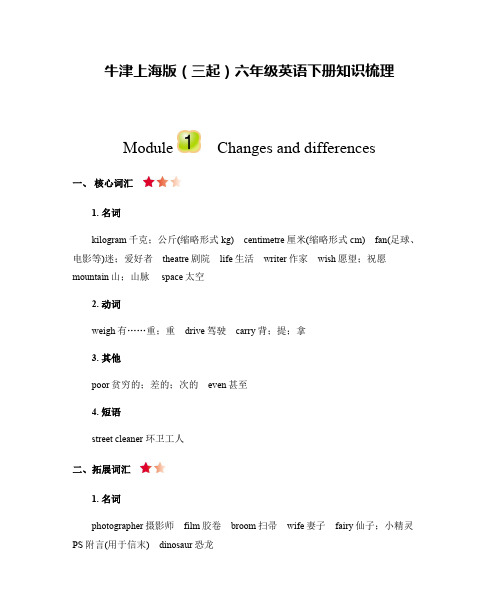
牛津上海版(三起)六年级英语下册知识梳理Module Changes and differences一、核心词汇 1. 名词kilogram千克;公斤(缩略形式kg) centimetre厘米(缩略形式cm) fan(足球、电影等)迷;爱好者 theatre剧院 life生活 writer作家 wish愿望;祝愿 mountain山;山脉 space太空2. 动词weigh有……重;重 drive驾驶 carry背;提;拿3. 其他poor贫穷的;差的;次的 even甚至 4. 短语street cleaner 环卫工人二、拓展词汇 1. 名词photographer摄影师 film胶卷 broom扫帚 wife妻子 fairy仙子;小精灵 PS附言(用于信末) dinosaur恐龙2. 动词sweep扫地3. 形容词fantastic极好的 digital数码的 4. 副词online在线地;在线的5. 代词themselves他们自己;她们自己;它们自己6. 其他taller更高的7. 短语go fishing去钓鱼 enjoy oneself玩得愉快;得到乐趣 get … in收割 street sweeper扫地车 by hand用手 right away立即;马上 in a short time很快 head teacher 校长 a piece of一张;一片 have a picnic去野餐 better and better越来越好三、核心句型 1. I’m 150 centimetres tall. 我身高150厘米。
解读:这是介绍身高的句型。
“主语 + be动词 + 数字 + 长度单位(+ tall).”可以用来介绍某人的身高。
举一反三: My cousin is 154 centimetres tall. 我的堂弟身高154厘米。
Jim is 149 centimetres tall. 吉姆身高149厘米。
上海版沪教版牛津英语六年级英语作文总结

Changes in our lives(unit2)Our country, China is getting stronger and stronger. Our life is getting better and better. There are many changes in our lives. In the past,people washed clothes by hand. Now people use a washing machine. In the past,people watched black and white TV. Now people watch colour TV. In the past, people wrote letters. Now people write emails.Changes in my school(unit3)My school was small and old. There were only 5 classrooms. There was a small library. Now my school is small,but it is new. There are 10 classrooms. There is a big library. There are many kinds of books in it. In the future, our school will be bigger. We will have lessons on the computer. I hope our school will be better and better.My favourite picture(unit4)My favourite picture is Sunflowers. It is a picture by Vincent van Gogh. It’s an oil painting.In this picture, there are many sunflowers in the vase. I like this picture because it’s beautiful.My favourite activity(unit6)We have two PE lessons at school every week. In PE lessons, I like playing football. I am a football fan. I usually play football with my friends after school. I like playing football because it helps me stay healthy and fit.Helping others(unit7)Better city,better life.How can you help others?At home, we can clean the table and read the newspaper to old people.At school, we can put rubbish in the bin and keep our classroom clean at school.We can give our seats to old people on the bus. We can help tourists find their way and help the blind cross the street on the street.Rules in the library(unit8)In the library, we should keep quiet. We should love the books. We should not draw on the desks. We should not litter. We should not smoke.How can we reuse paper(Unit9)We can write on both sides. We can stick old envelopes together. Then we put cards or photos in it. We can reuse a gift box and put toys and crayons in it.My favourite story(unit10)My favourite story is “The ugly duckling”. Andersen wrote the story. The story is about an ugly duckling. He becomes a beautiful swan. I like this story because it’s interesting.My favourite festival(unit 11)My favourite festival is Christmas. It’s on 25th December. At this festival, people give presents to each other. Children wait for presents from Father Christmas on Christmas Eve. I like this festival because it’s interesting.。
Unit 10 第2课时 课文讲解及句型拓展-六年级英语下册(牛津上海版)
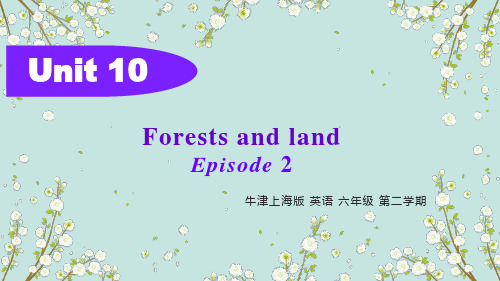
4
What do we get from the environment?
5
6
7
7-2CBiblioteka We get wood from trees. We can use wood to make paper.
1
2
3
4
5
6
7
7-3
C
We get plastic from oil. We can use plastic to make cups.
We get wool from sheep.
We get cotton from plants.
We can use wool and cotton to make clothes.
We get glass from sand.
We can use glass to make bottles.
1
We get plastic from oil.
We can use plastic to make cups.
We get oil, metal and clay from the ground.
We can use metal to make spoons.
We can use clay to make plates.
1
2
3
4
5
6
7
7-6
C
We get glass from sand. We can use glass to make bottles.
1
2
3
4
5
6
7
7-7
C
What do we get from the environment?
牛津版六年级英语下—U10同步—阅读综合—听力—作文
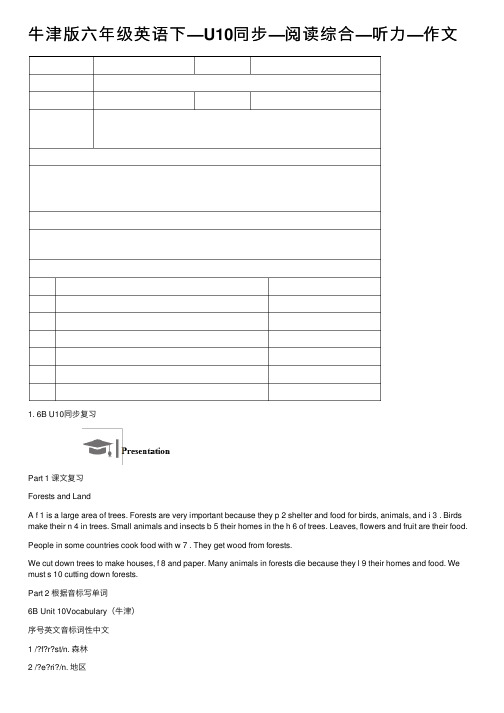
⽜津版六年级英语下—U10同步—阅读综合—听⼒—作⽂1. 6B U10同步复习Part 1 课⽂复习Forests and LandA f 1 is a large area of trees. Forests are very important because they p 2 shelter and food for birds, animals, and i 3 . Birds make their n 4 in trees. Small animals and insects b 5 their homes in the h 6 of trees. Leaves, flowers and fruit are their food. People in some countries cook food with w 7 . They get wood from forests.We cut down trees to make houses, f 8 and paper. Many animals in forests die because they l 9 their homes and food. We must s 10 cutting down forests.Part 2 根据⾳标写单词6B Unit 10Vocabulary(⽜津)序号英⽂⾳标词性中⽂1 /?f?r?st/n. 森林2 /?e?ri?/n. 地区3 /pr??va?d/v. 供给4 /b?ld/ v. 建造5 /w?d/ n. ⽊头6 砍倒7 /?f?:n?t??(r)/ n. 家具8 ⼀件家具9 /w?l/ n. ⽺⽑10 /?k?tn/ n. 棉花11 /?pl?st?k/ n.&adj. 塑料(的)12 /??l / n. 油;⽯油13 /?metl /n.&adj. ⾦属(的)14 /gra?nd / n. ⼟地15 /s?nd/ n. 沙16 /m??t??ri?l/ n. 材料Part 3 词汇语法复习⼆、6B U10词汇与知识点整理1.area n. 地区,区域We are going to build a school in this area.我们准备在这个区域内建⼀所学校。
牛津英语上海版六年级第二学期课件

We get wood from trees.
2.What can we use glass to make?
We can use wood to make chopsticks.
3.What is it made of?
It’s made of…
Teaching difficulties
Using the key sentence pattern in the context
3. Lose :失去,丢失
常见心律失常心电图诊断的误区诺如 病毒感 染的防 控知识 介绍责 任那些 事浅谈 用人单 位承担 的社会 保险法 律责任 和案例 分析现 代农业 示范工 程设施 红地球 葡萄栽 培培训 材料
Keys for look, read and write
in trees provide/birds ,animals / insects build my home Leaves, flowers/fruit make/furniture/paper/important/ stop
Teaching Contents
Words:
forest area provide build wood cut down wool cotton plastic oil metal sand wooden woollen
Sentence Pattern:
1.What do we get from the environment?
Summary
Word Box
forest area provide build wood cut down wool cotton plastic oil metal sand wooden woolen
牛津译林版六年级英语下册6B U1-U3单元重点知识总结
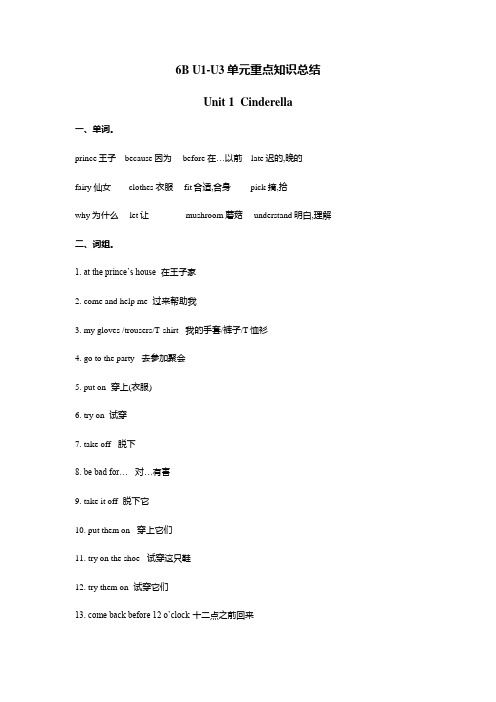
6B U1-U3单元重点知识总结Unit 1 Cinderella一、单词。
prince王子 because因为 before 在…以前 late迟的,晚的fairy 仙女 clothes 衣服 fit合适,合身 pick 摘,拾why 为什么 let让 mushroom 蘑菇 understand明白,理解二、词组。
1. at the prince’s house -在王子家2. come and help me -过来帮助我3. my gloves /trousers/T-shirt -我的手套/裤子/T恤衫4. go to the party -去参加聚会5. put on -穿上(衣服)6. try on -试穿7. take off -脱下8. be bad for… -对…有害9. take it off -脱下它10. put them on -穿上它们11. try on the shoe -试穿这只鞋12. try them on -试穿它们13. come back before 12 o’clock-十二点之前回来14. be sad /happy -伤心/开心15. have a good/great time -玩得开心16. at the party -在聚会上17. have to do sth. -不得不做某事18. have to come home -不得不回家19. visit every house -拜访每一户20. fit sb well -很适合某人21. at 12 o’clock -在十二点22. put on the English play -表演(演出)这个英语剧23. have a drink -喝饮料24. draw a dress for her friend -为她的朋友画一件连衣裙25. read stories -读故事26. have some snacks -有一些零食27. at a snack bar -在零食店28. thirsty and hungry Bobby -饥渴交加的波比29. in the forest -在森林里30. find some mushrooms -发现一些蘑菇31. under the tree -在树下32. pick a big red mushroom -摘了一个又大又红的蘑菇33. pick up the book =pick the book up-捡起这本书34. pick them up -把它们捡起来35. leave a shoe behind -把一只鞋子留下了36. don’t understand why -不明白为什么37. foot hurts -脚疼38. be bad /good for… -对…有坏处/好处39. have to -不得不,必须40. leave…behind -留下;丢下41. have some nice clothes and shoes -有些漂亮衣服和鞋子42. don’t have any nice clothes or shoes -没有漂亮衣服和鞋子43. put on the new clothes= put the new clothes on-穿上新衣服44. take off his white jacket=take his white jacket off -脱下他白色的夹克衫三、句型。
牛津英语上海版六年级下册知识点整理

牛津英语上海版六年级下册知识点整理Module1 City lifeUnit1 Great cities in Asian词组:the capital of... ...的首都 north-east东北 from...to...从...到...in the past在过去 the Great Wall长城 more than=over超过eat dumpling吃饺子 tall buildings高楼大厦huge department stores大型的百货商店 a lot of许多语法点:1.Beijing is north of Shanghai.北京在上海的北部。
(1)两地不相邻:A is north of B.(2)所属关系:A is in the north of B.(3)两地接壤:A is on the north of B.2.How far is it from Shanghai to Beijing?从北京到上海有多远?How far... 多远。
询问距离的远近,路程的长远。
3.How long does it take to travel from Shanghai to Beijing by train?坐火车从上海到北京要多久?(1)How long...多久。
询问时间长短。
How long…多长。
用于询物的问长度。
(2)by+交通工具,表示“乘...交通工具”,用How提问。
4.It takes about ten hours.大约需要十小时It takes (sb.) st. to do sth. 做某事需要花费多长时间。
5.They enjoy eating dumplings.他们喜欢吃饺子enjoy/like/love doing sth. 喜欢做某事6.Two and a half days=Two days and a half两天半Half an hour=one and a half hours=one/an hour and a half一个半小时Unit2 At the airport词组:plane ticket机票 silk scarf丝巾 a lot of/plenty of大量的,许多departure time出发时间 leave for出发去某地 have to不得不be going to将要 arrive at到达boarding card登机牌 name tap姓名语法点:1.Aunt Judy and Uncle Mike have lived in Los Angeles for six years.朱迪婶婶和迈克叔叔在洛杉矶已住了六年。
牛津英语上海版一至五年级单词总汇按照每册单元
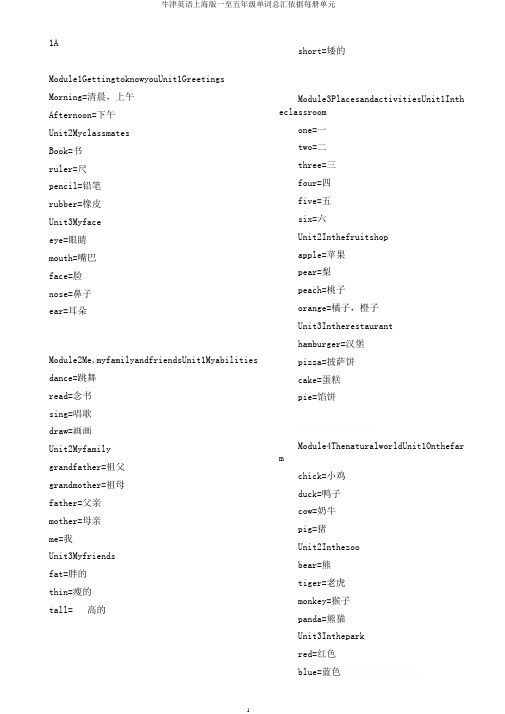
1AModule1GettingtoknowyouUnit1Greetings Morning=清晨,上午Afternoon=下午Unit2MyclassmatesBook=书ruler=尺pencil=铅笔rubber=橡皮Unit3Myfaceeye=眼睛mouth=嘴巴face=脸nose=鼻子ear=耳朵Module2Me,myfamilyandfriendsUnit1Myabilities dance=跳舞read=念书sing=唱歌draw=画画Unit2Myfamilygrandfather=祖父grandmother=祖母father=父亲mother=母亲me=我Unit3Myfriendsfat=胖的thin=瘦的tall= 高的short=矮的Module3PlacesandactivitiesUnit1Inth eclassroomone=一two=二three=三four=四five=五six=六Unit2Inthefruitshopapple=苹果pear=梨peach=桃子orange=橘子,橙子Unit3Intherestauranthamburger=汉堡pizza=披萨饼cake=蛋糕pie=馅饼Module4ThenaturalworldUnit1Onthefar mchick=小鸡duck=鸭子cow=奶牛pig=猪Unit2Inthezoobear=熊tiger=老虎monkey=猴子panda=熊猫Unit3Intheparkred=红色blue=蓝色yellow=黄色green=绿色1BModule1UsingmyfivesensesUnit1Lookandsee frog=青蛙rabbit=兔子bee=蜜蜂bird=鸟Unit 2Listenandhearsheep=羊,绵羊hen=母鸡dog=狗cat=猫Unit 3Tasteandsmellrice=米饭,饭soup=汤egg=鸡蛋,蛋noodles=面条Module2MyfavouritethingsUnit1ToysIlike ball=球doll=洋娃娃bicycle=自行车kite=风筝Unit 2FoodIlikejelly= 果冻icecream=冰激凌sweet=糖果biscuit= 饼干cola=可乐juice=果汁milk=牛奶water=水Module3ThingsaroundusUnit1Seasonswarm=暖和的hot=热的spring=春季summer=夏季Unit 2Weathersunny=明朗的cloudy=多云的rainy=下雨的windy=起风的,多风的,风大的Unit 3ClothesT-shirt= 短袖圆领汗衫〔运动衫〕dress=连衣裙?shorts=宽松运动短裤?blouse=女士上衣(有钮扣)?Module4ThingswedoUnit 1Activitiesride=骑〔自行车,马〕skip=跳,跳绳play=玩(游戏),打(球),踢(球),打(牌),下(棋)fly=飞Unit 2NewYear'sDaygift= 礼品card=贺卡firecracker= 爆竹,爆竹firework=烟火,烟花Unit 3DrinksIlike Unit3Storytimeboy=男孩儿wolf=狼farmer=农民2AModule1GettingtoknowyouUnit1Hello Morning=清晨,上午Afternoon=下午evening=傍晚;夜晚night=夜;夜晚Unit2I'mDannyboy=男孩儿girl= 女孩儿??big=?大的small=小的Unit3Anewclassmateseven=七eight=八nine=九ten=十Module2Me,myfamilyandfriendsUnit1Icamswim run=跑write=写,写字swim=游泳?fly=飞Unit2That'smyfamilyold=年长的,老的young=年青的Unit3Myhairisshorthair=头发head=头face=脸Unit1Inthechildren'sgardenslide=滑滑梯swing=秋千seesaw=跷跷板Unit2Inmyroombag=书包,包box=盒子desk=书桌chair=椅子Unit3Inthekitchenkitchen=厨房bowl=碗spoon=调羹,勺子chopsticks=筷子Module4ThenaturalworldUnit1Inthesky sun=太阳moon=月亮star=星星Unit2Intheforestfox=狐狸hippo=河马meat=肉grass=草Unit3Inthestreetflower=花,花朵tree=树pick=采,摘climb=爬,登攀,登上2BModule3Placesandactivities Module1UsingmyfivesensesUnit1Whatcanyousee?white=白色purple=紫色pink=粉红色orange=橘黄色brown=棕色,咖啡色black=黑色Unit 2Touchandfeelwatch=腕表bag=包,书包soft=软的,柔嫩的hard=硬的rough=粗拙的smooth=圆滑的Unit 3Whatcanyouhear?train=火车bus=公交车car=汽车,轿车van=有盖小货车,箱形客货两用车bicycle=自行车ship=?船,舰Module2MyfavouritethingsUnit1ThingsIlikedoingrun=跑skate=滑冰,滑冰?hop=单脚跳skip=跳,跳绳rideabicycle= 骑自行车Unit 2Myfavouritefood salad=沙拉,色拉carrot=胡萝卜fish=鱼chicken=鸡肉banana=香蕉Unit 3AnimalsIlike giraffe= 长颈鹿snake=蛇elephant=大象zebra=斑马Module3Thingsaroundus Unit1Thefourseasons autumn=秋季winter=冬季cool=凉快的cold=严寒的Unit 2Rulesstop=停下,停止go=走,行走wait=等候light= 灯;〔交通〕灯Unit 3Myclothes trousers=裤子sweater=毛衣,套头毛衣shirt=衬衫coat=大衣Module4Morethingstolearn Unit 1Activities playfootball= 踢足球playbasketball= 打篮球playping-pong= 打乒乓playcards= 打牌Unit 2Mother'sDay letter= 信,信函balloon=气球carnation=康乃馨Unit 3Storytime hungry=饿的,饥饿的thirsty= 渴的bread=面包milk=牛奶3AModule1GettingtoknowyouUnit1Howareyou? Miss=小姐Mr=先生Mrs=太太Unit2What'syourname?standup=起立sitdown=坐下open=打开close=关上door=门name=名字book=书write=白色的Unit3Howoldareyou?one=一two=二three=三four=四five=五six=六seven=七eight=八nine=九ten=十today=今日Module2Me,myfamilyandfriendsUnit1Myfriends fat=胖的thin=瘦的,细的tall= 高的short=矮的,短的boy=男孩girl= 女孩friend=朋友Unit2Myfamilygrandfather=( 外)祖父;爷爷,外公grandmother=(外)祖母;奶奶,外婆father=父亲mother=母亲brother=哥;弟sister= 姐;妹me=我Unit3Aboutmeeye=眼睛nose=鼻子hair=头发ear=耳朵mouth=口,嘴巴small=小的long=长的big=大的Module3PlacesandactivitiesUnit1Myschoolclassroom=教室school=学校hall=大厅toilet= 卫生间library= 图书室office= 办公室playground=操场Unit2Shoppingapple=苹果orange=橘子;adj.橙红色的banana=香蕉peach=桃子Unit3Intheparkboat=小船balloon=气球flower=花kite=风筝red=红色的orange=橘子;adj.橙红色的yellow=黄色的Module4ThenaturalworldUnit1Insectsladybird=黄色的bee=蜜蜂butterfly= 蝴蝶ant=蚂蚁fly=飞black=黑色的Unit2Onthefarmchick=小鸡hen=母鸡duck=鸭子pig=猪dog=狗cat=猫Unit3Plantsleaf(leaves)= 叶子branch=树枝trunk=树干root=根plant=植物green=绿色的pink=粉红色的beautiful= 美丽的3BModule1UsingmyfivesensesUnit1Seeing andhearingaeroplane=飞机bus=公交车ship=船,舰car=轿车,汽车Unit 2Touchingandfeelingpineapple=菠萝cake=蛋糕bread=面包glass=玻璃杯,玻璃bag=书包,包Unit 3Tastingandsmellingsweet=n.糖果;adj.甜的lemon=柠檬sour=酸的salt=盐salty=咸的coffee=?咖啡bitter= 苦的,有苦味的Module2MyfavouritethingsUnit1Animalstiger=老虎lion=狮子panda=熊猫monkey=猴子clever=聪慧的strong=强健的Unit 2Toystoytrain= 玩具火车doll=洋娃娃skateboard=滑板robot=机器人lovely=可爱的Unit 3Clotheshat=帽子scarf=围巾jacket=夹克衫apairofgloves= 一帮手套apairofsocks= 一双袜子apairofshoes= 一双鞋子funny=可笑的,风趣的his=他的Module3ThingsaroundusUnit1Shapescircle= 圆形,圆圈square=正方形triangle= 三角形star=星星rectangle=长方形house=房屋Unit 2Colourssky=天空sea=海洋mountain=山river=河流,河Unit 3Seasons plantatree= 种树haveapicnic= 野餐ice-skate= 滑冰ski= 滑雪Module4Morethingstolearn Unit 1Mybodybody=身体head=头shoulder=肩膀arm=手臂,胳膊finger=手指hand=手knee=膝盖leg=大腿foot=脚〔单数〕feet=脚〔复数〕Unit 2Children'sDay park=公园cinema=电影院zoo=动物园our=我们的class=班级party=聚会takeaphotograph= 摄影片parent=父亲母亲Unit 3Storytime〔该单元无单词〕4AModule1GettingtoknowyouUnit1Meetingnewpeople eleven=十一twelve=十二thirteen= 十三fourteen=十四fifteen= 十五sixteen=十六classmate=同学Unit2Abilitiespaint=用颜料画画draw=绘画read=阅读write=写,写字swim=游泳jump=跳fast=快,快速picture=照片;图画very=特别,很well=好fly=飞high=高,在高处Unit3Howdoyoufeel?happy=快乐的hungry=饿的thirsty= 口渴的sad=悲伤的full= 饱的tired=累的,疲备的back=回来biscuit= 饼干then=那么既然这样那时Module2Me,myfamilyandfriends Unit1Jill'sfamilyuncle=叔,舅,姨夫,姑父aunt=姑母,姨母,舅母,婶婶cousin=表兄妹,堂兄妹policeofficer= 警察Unit2Jobsdoctor=医生nurse=护士teacher=教师student=学生firefighter= 消防员cook=厨师busdriver= 公交车司机Unit3Ihaveafriendcoat=外衣shirt= 衬衫blouse=女式衬衣T-shirt=T 恤衫skirt= 短裙sweater=毛衣,线衣jeans=牛仔裤shorts=短裤pink=粉红色的friend=朋友Module3Placesandactivities Unit1Inourschoolnew=新的canteen=食堂computerlab=电脑房office= 办公室gum=体育馆behind=在后边infrontof= 在前面building= 大楼,建筑物lesson=课lunch=午饭Unit2Aroundmyhome supermarket=商场postoffice= 邮局restaurant= 餐馆nextto=紧邻,在近旁between=在中间street=街道shop=商铺near=在旁边,凑近city=城市many=很多some=一些Unit3Intheshop apacketofsweets= 一包糖果aloafofbread= 一条面包abowlofnoodles= 一碗面条abarofchocolate= 一块巧克力apacketofbiscuits= 一包饼干abottleofwater= 一瓶水Module4ThenaturalworldUnit1Avisittoafarmhay=干草grass=草,草地corn=谷物meat=肉Don’tlitter=不要乱扔垃圾Don’twalkonthegrass=不要在草地上走Don’tpickflowers=不要摘花Don’tthro wstones= 不要乱扔石头farm=农场rubbish=垃圾visit=n. 旅行,观光v. 观光,拜见bin=垃圾箱Unit2AttheCenturyParksketchbook=写生簿,素描簿cap=〔有帽舌的〕帽子camera=照相机aviary=鸟舍fountain=喷泉pond=池塘faraway=距离远road=道路take=乘坐,摄影Unit3Weathersunny=明朗的rainy=多雨的cloudy=多云的windy=多风的warm=暖和的hot=热的wet=湿的dry=乏味的January=一月February=二月March=三月April=四月May=五月June=六月July=七月August=八月September=九月October=十月November=十一月December=十二月China=中国Australia= 澳大利亚always=老是4BModule1UsingmyfivesensesUnit1Whatcanyousmellandtaste? watermelon=西瓜grape=葡萄plum=李子cherry=樱桃strawberry=草莓aglassof= 一杯juice=果汁Unit 2Howdoesitfeel?hard=硬的soft=软的,柔嫩的rough=粗拙的smooth=圆滑的Sharp=尖利的blunt=钝的,不尖利的thick=厚的thin=瘦的knife=小刀pencil=铅笔pencilcase= 铅笔盒Unit 3Lookattheshadow!hill= 小山;丘陵lawn=草坪,草地path=小径,小道bench=长凳,长椅shadow=荫,灰暗处,影子(the)sun=? 太阳rise=上涨high=高的atnoon=在正午godown=向下走Module2MyfavouritethingsUnit1Sportsplayfootball= 踢足球playtabletennis=打网球playvolleyball=打排球playbadminton=打羽毛球playbasketball=打篮球sport=运动poster=海报join=参加club=俱乐部Unit 2Cuteanimalsbone=骨头catfood=猫食,猫粮dogfood=狗粮fish=鱼parrot=鹦鹉tortoise= 乌龟cute=可爱的Unit 3Homelifebedroom=寝室livingroom= 客堂bathroom=卫生间,卫生间kitchen=厨房homework=回家作业,作业modelplane=模型飞机wash=洗dinner=晚饭;正餐Module3ThingsaroundusUnit1Soundsquiet=寂静的loud=响的,高声的bell=凉铃,铃铛television(TV)= 电视sound=声音noisy=喧华的ring=v.响起铃声watchTV=看电视Unit 2Timeseveno'clock= 七点aquarterpastseven= 七点一刻〔7:15〕halfpastseven= 七点半〔7:30〕aquartertoeight= 七点三刻〔7:45〕getup=起床brushmyteeth= 刷牙washmyface=洗脸havebreakfast= 吃早餐Unit 3Daysoftheweekalways=老是usually= 往常地;惯常地often=常常sometimes=有时never=素来不Monday=礼拜一Tuesday=礼拜二Wednesday=礼拜三Thursday=礼拜四Friday=礼拜五Saturday=礼拜六Sunday=礼拜天Chinesechess=中国象棋atweekends=在周末Module4MorethingstolearnUnit1AMusic classpiano=钢琴violin= 小提琴triangle= 三角形drum=鼓music=音乐Unit2FestivalsinChinatheSpringFestival=春节theDragonBoatFestival=端午节theMid-autumnFestival=中秋节theDoubleNinthFestival=重阳节festival=节日ricedumpling=粽子Unit3Storytimeduckling=小鸭子swan=天鹅nest=鸟巢,鸟窝5AModule1GettingtoknowyouUnit1Mybirthdayfirst= 第一second=第二third= 第三fourth= 第四fifth= 第五sixth= 第六party=聚会begin=开始bring= 带来wear=穿,戴favorite= 最喜爱的Unit2Mywaytoschooltaxi= 出租车underground=地铁zebracrossing= 斑马线trafficlight(s)= 红绿灯,交通讯号灯pavement=人行道live= 住,居住leave=走开by=经过〔表示方式、方法〕onfoot= 步行arrive(at)= 抵达cross=穿过Unit3Myfutureworker=工人pilot= 翱翔员farmer=农民shopassistant= 营业员,销售员fly= 飞help=帮助sick=有病的,患病的Module2Me,myfamilyandfriends Unit1Grandparentswriteane-mail= 写电子邮件goshopping=去购物playchess= 下〔国际〕象棋once=一次twice=两次talk= 谈话,说话(the)Internet= 互联网,因特网Unit2Friendssame=相同的,相同的different= 不一样的both=〔二者〕都all= 全部的class=班级eachother= 相互together= 一同Unit3Movinghomenorth=北方,北边south=南方,南边west=西方,西边east=东方,东边study=学习alotof= 很多Module3PlacesandactivitiesUnit1Aroundthecityhotel=酒店,旅馆bank=秋银行hospital= 医院bakery=面包店museum=博物馆cinema=电影院along=沿着turn=转弯Unit2Buyingnewclothes button=纽扣zip=拉链pocket=口袋need=需要puton=穿上tryon=试穿Unit3Seeingthedoctor fever=发热toothache=牙痛cough=咳嗽cold=感冒well=健康的,身体好的medicine=药Module4Thenaturalworld Unit1Waterfirst= 第一next=其次,接下来then=而后finally= 最后tea=茶boil=煮开,煮沸pour=倒出drink=喝Unit2Windgently=轻轻地strongly=剧烈地,强有力地slowly=迟缓地quickly=快速地blow=吹,刮happily=高兴地Unit3Firesmoke=抽烟start=开始campfire=营火,篝火match=竞赛,火柴careful=认真的safety 安全5BModule1Usingmyfivesenses Unit1Whatamess! schoolbag=书包brush=毛笔,画笔paints=绘画颜料crayon=蜡笔notebook=笔录本glue=胶水Tape=磁带Put=放,布置Unit 2Watchitgrow!egg=卵,蛋cocoon=茧caterpillar= 毛虫chicken=鸡肉duckling=小鸭子puppy=小狗grow=成长,生长fly=翱翔,翱翔was=am/is的过去式were=are的过去式Unit 3Hownoisy!drill= 钻机,钻头lorry=卡车motorbike=有盖小货车,箱形客货两用车outside=自行车sleep=?睡觉another=另一个noise=噪音heard=hear的过去式sat=sit 的过去式Module2MyfavouritethingsUnit1Foodanddrinksmeat=肉pork=猪肉beef=牛肉chicken=鸡肉fish=鱼,鱼肉fruit= 水果vegetable=蔬菜tomato=番茄potato=土豆carrot=胡萝卜cabbage=卷心菜bean=豆子rice=米饭,饭drink=喝milk=牛奶had=have/has的过去式eat=吃healthy=健康的did=do的过去式keep away=不让凑近〔某人/某物〕Unit 2Filmsticket= 入场券ticketoffice= 售票处exit=出口entrance=进口seat=座位film=电影funny=风趣的princess=公主seeafilm= 看电影Unit 3SchoolsubjectsChinese=〔学科〕语文English=〔学科〕英语Maths=〔学科〕数学Art=〔学科〕美术Music=〔学科〕音乐IT=〔学科〕信息技术PE=〔学科〕体育class=课,课程subject=科目Module3ThingsaroundusUnit1Signstelephone=smoking=抽烟swimming=游泳walk=牵着〔动物〕走,遛sign=标记,指示牌Unit 2Weathercloud=云朵rain=雨snow=雪snowy=下雪的storm=狂风雨stormy=有狂风雨的fog=雾foggy=有雾的yesterday=昨天degree=度,度数〔温度单位〕weather=天气make=使,让Unit 3Changes bookshelf=书架mirror=镜子cushion=坐垫,靠垫cupboard=橱柜,衣柜bed=床lamp=台灯sofa=沙发furniture= 家具next=紧随后来的,下一个的give=给move=改变地点,挪动window=窗户wall=墙壁Module4Morethingstolearn Unit1Museumsciencemuseum=科技博物馆artmuseum=艺术博物馆historymuseum=历史博物馆insectmuseum=昆虫博物馆carmuseum=汽车博物馆railwaymuseum=铁路博物馆perform=表演dance=跳舞useful=实用的really= 特别,极其Unit2WesternHolidays Christmas=圣诞节Easter=复生节Halloween=万圣节Thanksgiving=感恩节find=找到,发现hide=隐蔽holiday=假期present=礼品Unit3Storytimegiant=巨人castle=城堡。
最新牛津上海版六年级下册《unit 10 forests and land》教案.doc

Module 3 Unit 10 Forests and landFirst PeriodTeaching objectives:1. Knowledge objective: To learn uncountable nouns: wood, furniture…To learn the phrases: get…from, provide…for2. Ability objective: To use get…from, provide…for to make sentences andknow more information about forests3. Emotion objective: To arouse the students to the students to stop cuttingdown forests and protect forests.Teaching procedure:I. Pre-task preparation1. T: Look at the photograph of the Earth. What are the blue parts?S: They are oceans.2. T: Look at the photograph again. What are the green parts?S: They are land.T: Do you know what’s on land?S: Forest.II. While-task procedure:1. T: Who lives in the forest?S: insects, birds and animals.2.T: What does Dilly find in the forest?S: nestT: What is the bird doing?S: make a nest.3.T: Where do these two foxes live?S: In the hollow.4.T: People get wod from the forest.People cut down trees.What do people use wood to do?S: make a fire, make paper, make furniture, make houses5.Look and read6.Answer questions7.Look,read and writeIII.Post-task activities:Think and say: What will happen if there are no forests?IV.Consolidation:1. Read and recite the new works2. Workbook 6B, page 663. Recite ‘Listen and read’Second PeriodTeaching objectives:1. Knowledge objective: To learn get…from, use…to make2. Ability objective: To use get…from, use…to make sentences3. Emotion objective: To arouse the students to protect the environment Teavhing procedure:I.Pre-task preparation:1. Answer true/ false2. Read and writeII.While-task procedure1. Look and learn2. Match the two columns and make sentences3. Listen and sayIII. Post-task activities1. Think and talk2. Do a surveyIV. Consolidation:1. Read and recite the new words2. Workbook 6B, pages 62 and 633. Recite ‘Listen and say’Third PeriodTeaching objectives:1. Knowledge objective: To learn get…from, use…to make2. Ability objective: To use get…from, use…to make sentences3. Emotion objective: To arouse the students to protect the environment Teaching procedure:I. Pre-task preparation1. Look, think and sayII. While-task procedure1. Think and write2. Look and learn3. Ask and answer4. Match and writeIII. Post-task activities1. Find out2. Think and writeIV. ConsolidationWorkbook 6B, page 67Fourth Period1. Knowledge objective: To learn be made of, It is+adj, It is… a adj. +n.2. Ability objective: To use be made of, It is+adj, It is… a adj. +n.tomake sentences3. Emotion objective: To arouse the students to protect the environment Teaching procedure:I.Pre-task preparation1. Ask and answer2. Read and writeII. While-task procedure:1. Touch,think and say2. Look and learn3. Play a game4. Feel and guess5. Ask, answer and write6. Think and talkIII. Post-task activities:Think and talkIV. Consolidation1. Read and recite p742. Workbook 6B, page 68。
Unit 10 第1课时 课文讲解及单词拓展-六年级英语下册同步精品课堂(牛津上海版)(精品课堂)

123456
C
PIGGY BANK
GOLD MINE
6-6
Many people use us to __m_a_k_e_____ houses, _f_u_r_n_i_t_u_r__ and __p_a_p_e_r____. Forests are i_m_p__o_r_t_a_n_t_ to alleanimals.
People must _s_t_o_p______ cutting down forests.
123456
C
PIGGY BANK
GOLD MINE
Think and say
What will happen if there are no forests?
C
二、单词讲解
1. area n.地区;区域 e. g. We are going to build a school in this area.我 们准备在这个区域内建一所学校。
1234
C
PIGGY BANK
GOLD MINE
4-2
Forests
A forest is a large area of trees. Forests are very /
important because they provide shelter and /
/
food for birds, animals and insects. Birds make
3. furniture n.家具(不可数名词)
本单元中出现了很多不可数名词,如:wood, wool, plastic等。常见的不可数名词还有:information信息 news新闻 music音乐
4. forest n.森林 e. g. -Forests are home to many animals and plants.森林是许多动植物的家园。
【最新】六年级下册单词、课文中译英(上海版牛津英语)

六下 Module 1 U nit 1巨大的;伟大的 great 亚洲 Asia日本 Japan 东京 Tokyo 泰国 Thailand 曼谷 Bangkok西北 north-west 东北 north-east 东南 south-east西南 south-west 展览会 exhibition 首都 capital(大)船;舰 ship多远 how far 千米,公里 kilometre旅行 travel 博物馆 museum宫殿 palace游客,观光者 tourist多于;超过 more than 百万 million欣赏;喜爱 enjoyUnit 2机场 airport票;入场券登机牌 ticket 手提箱 suitcase 丝绸 silk 围巾;头巾scarf 洛杉矶 Los Angeles以前 before停留;呆 stay 几个 several然而 however 装(箱) pack足够的,充足的航班 enough 空间 space去... leave for... 应该 should到达... arrive at... 不得不 have to担心 worry离开,出发 departure 航班 flight乘客;旅客 passenger 护照 passport 登机牌 boarding card带来 bring元(美国,加拿大等货币) dollar 地址 addressUnit 3端午节 Dragon Boat Festival 比赛 race某物,某事 something 庆祝 celebrate 出生(be )born一千 thousand 以前 ago 国家 country 很,非常 very much 劝告,忠告 advice向...提出建议 give advice to...国王 king接受(某人的)劝告 take one ’s advice死,死亡 die 以后,后来 later 输掉,失去 lose战役 battle处于危险中 in danger河,江 river 农历的 lunar 纪念,记得 remember 有,带有 with没有 without 月饼 moon cake甜食,甜点,布丁 pudding 宁愿 would ratherUnit 4 保持 stay 保持健康 stay healthy 室内的 indoor 室外的 outdoor 篮球 basketball 电影,胶片 film 网球 tennis 模型 model去野餐 go on a picnic 邮票 stamp 烧烤野餐 barbecue来一次烧烤野餐 have a barbecue 头痛 headache 胃痛 stomach ache 牙痛 toothache 感冒 cold 发烧 fever 疼痛的 sore 咽喉 throat锻炼,运动 exercise 真正的,的确 really体育运动 sport 忘记 forgetModule 2 Unit 1 在...前面 in front of 有魔力的 magic 寻找 look for 开始 start按钮 button纸币,注释 note 按,压 press 微笑,笑 smile 背面,反面 back...年后 in...years ’time 重的 heavy 厘米 centimetre有...重,称...的重量 weigh 千克,公斤 kilogram宇航员 astronaut 同意 agree 擅长(be )good at 灭火 put out fires 可能的 possibly 苗条的 slim(外貌)好看的 good-looking不擅长,...差的(be )poor at 数学 Maths 练习,训练 practise 学,学习 learn 航天器,宇宙飞船 spacecraft 回来,返回 come backUnit 2季节性的 seasonal 变化 change 生活 life到处,向各处 around 有空调的 air-conditioned 学习 study食堂,餐厅 canteen 保暖 keep warm雪人 snowman 热饮料 hot drink 通知 notice早期的,早先的 early 袖子 sleeve 裤子 trousers短上衣,夹克衫 jacket短裙 skirt短裤 shorts皮带 belt Unit3双层车 double-decker 车费 fare在过去 in the past售票员 conductor 现今 nowadays 单层车 single-decker 大多数 most 没有一个 none 仍然,依旧,还是 still 也许,大概,可能 perhaps 不多的,很少的 few堵车,交通阻塞 traffic jam 轻便摩托车 motorcycle铁路 railway 停车场 car park 桥 bridge人行横道,十字路口 crossing 公共汽车停靠站 bus stopModule 3 Unit 1(使)下沉,(使)沉没 sink 清洁工人 cleaner 愉快的 happily 起先 at first 温和的 gently 轻微的 slightly 缓慢地 slowly 突然 suddenly 快速的 quickly 立即 immediately台风 typhoon 猛烈的 fiercely行进,移动 pass 小心的 carefully 温和的 gentle 拿着,抓住 hold雨衣 raincoat紧紧的 tightly旗,旗帜 flag进行帆板运动 windsurf盆 pot可能 may物体 object (使)破,碎 break波浪 waveUnit 2四分之一 quarter 小河,溪流 stream 地球 earth 鲸 whale聪明的 intelligent海星 starfish 海马 sea horse 有趣的 interesting 重要的 important 污染,弄脏 pollute 覆盖 cover 如果 if淋浴 shower 洗淋浴 take a shower 农作物 crop使用,利用;用途,功能 use节省,节约 save 浪费 waste 修理 fix 滴(漏)水的 dripping 水龙头 tap 流动的 running 关掉 turn off 代替 instead of 沐浴,洗盆浴 bathUnit 3森林 forest 陆地,土地 land 地区 area 窝,巢 nest 洞,孔 hollow 木头 wood砍倒 cut down 找出,查明 find out 环境 environment塑料,塑料制的,塑料的 plastic油,石油 oil 羊毛 wool 棉花,棉布 cotton 玻璃,玻璃杯 glass 沙 sand 材料 material由...制成的(be )made of 木制的 wooden毛纺的,羊毛的 woollen 一件商品(物品)itemModule 1 U nit 1 巨大的;伟大的亚洲日本东京泰国曼谷西北东北东南西南展览会首都(大)船;舰多远千米,公里旅行博物馆宫殿游客,观光者多于;超过百万欣赏;喜爱Unit 2机场票;入场卷登机牌手提箱丝绸围巾;头巾洛杉矶以前停留;呆几个然而装(箱)足够的,充足的航班空间去... 应该到达... 不得不担心 离开,出发航班乘客;旅客 护照 登机牌带来元(美国,加拿大等货币) 地址Unit 3端午节 比赛 某物,某事 庆祝 出生一千 以前 国家很,非常 劝告,忠告向...提出建议国王接受(某人的)劝告 死,死亡 以后,后来输掉,失去 战役 处于危险中 河,江 农历的 纪念,记得 有,带有 没有 月饼甜食,甜点,布丁 宁愿Unit 4保持保持健康室内的室外的篮球电影,胶片网球模型去野餐邮票烧烤野餐来一次烧烤野餐头痛胃痛牙痛感冒发烧疼痛的咽喉锻炼,运动真正的,的确体育运动忘记Module 2Unit 1 在...前面有魔力的寻找开始按钮纸币,注释按,压微笑,笑背面,反面...年后重的厘米有...重,称...的重量千克,公斤宇航员同意擅长灭火可能的苗条的(外貌)好看的不擅长,...差的数学练习,训练学,学习航天器,宇宙飞船回来,返回Unit 2 季节性的变化生活到处,向各处有空调的学习食堂,餐厅保暖雪人热饮料通知早期的,早先的袖子裤子短上衣,夹克衫短裙短裤皮带Unit3 双层车车费在过去售票员现今单层车大多数没有一个仍然,依旧,还是也许,大概,可能不多的,很少的堵车,交通阻塞轻便摩托车铁路停车场桥人行横道,十字路口公共汽车停靠站Module 3Unit 1 (使)下沉,(使)沉没清洁工人愉快的起先温和的轻微的缓慢地突然快速的立即台风猛烈的行进,移动小心的温和的拿着,抓住雨衣紧紧的旗,旗帜进行帆板运动盆可能物体(使)破,碎波浪Unit 2 四分之一小河,溪流地球鲸聪明的海星海马有趣的重要的污染,弄脏覆盖如果淋浴洗淋浴农作物使用,利用;用途,功能节省,节约浪费修理滴(漏)水的水龙头流动的关掉代替沐浴,洗盆浴Unit 3 森林陆地,土地地区窝,巢洞,孔木头砍倒找出,查明环境塑料,塑料制的,塑料的油,石油羊毛棉花,棉布玻璃,玻璃杯沙材料由...制成的木制的毛纺的,羊毛的一件商品(物品)Module 1 U nit 1great AsiaJapan Tokyo Thailand Bangkoknorth-west north-east south-eastsouth-west exhibition capitalshiphow farkilometretravelmuseumpalace touristmore than millionenjoyUnit 2airportticket suitcase silk scarf Los Angelesbeforestay severalhowever packenough spaceleave for... shouldarrive at... have toworrydepartureflightpassenger passport boarding cardbring dollar addressUnit 3 Dragon Boat Festival race something celebrate (be )bornthousand ago country very much advicegive advice to...kingtake one ’s advice die laterlosebattlein danger river lunar remember withwithout moon cake pudding would ratherUnit 4 stay stay healthy indoor outdoor basketball film tennis modelgo on a picnic stamp barbecue have a barbecue headache stomach ache toothache cold fever soreexercise hroat exercise reallysport forgetModule 2 Unit 1in front of magic look for start button note press smile backin...years ’time heavy centimetre weigh kilogramastronaut agree(be )good at put out fires possibly slimgood-looking(be )poor atMaths practise learn spacecraft come backUnit 2seasonal change life aroundair-conditioned study canteen keep warmsnowman hot drink notice early sleeve trousersjacketskirtshortsbelt Unit3double-decker fare in the pastconductor nowadays single-decker most none still perhaps fewtraffic jam motorcyclerailway car park bridge crossing bus stopModule 3 Unit 1sink cleaner happily at first gently slightly slowly suddenly quickly immediatelytyphoon fiercelypass carefully gentle holdraincoattightly flag windsurfpotmayobject breakwaveUnit 2quarter stream earth whale intelligentstarfishsea horseinterestingimportantpollutecoverifshower take a showercropusesavewaste fix drippingtaprunningturn offinstead ofbath Unit 3forest landareanesthollowwoodcut downfind outenvironmentplasticoilwoolcottonglasssandmaterial(be)made ofwoodenwoollenitemModule 1 City lifeUnit 1 Great cities in Asia郭老师和她的学生们在一个关于亚洲著名城市的展览会上。
上海牛津版英语六年级下册6BUnit10U10同步讲义

学员编号:年级:课时数:学员姓名:辅导科目:英语学科教师:授课类型TUnit10(牛津6下)基础知识梳理教学目标1、使学生能够基本掌握牛津6年级下册Unit10中的基础词汇及重要句型;2、使学生对本单元的知识点会综合运用并掌握相关试题的解题方法。
星级★★★授课日期及时段T同步-U10基础知识梳理(建议2-5分钟)A forest is a large area of trees.Forests are very important.Birds make their nests intrees.Small animals and insectsbuild their homes in thehollows of the trees.People in poor countries burn wood as fuel.We cut down trees to make furniture andpaper.除了上面的,森林和土地还有什么作用呢,让我们继续往下看吧~~(建议20-25分钟)一、词汇Words1. forest n. 森林e. g. -Forests are home to many animals and plants.森林是许多动植物的家园。
-We must take care of our forests.我们必须爱护我们的森林。
批注:forest是可以用复数的,提醒学生注意课文标题,forests and land2. hollow n.凹地,穴,洞e. g. the hollow of the hand手心the hollow of the tree树洞3. area n.地区;区域e. g. We are going to build a school in this area.我们准备在这个区域内建一所学校。
In some areas, there are small schools for a few farm families, and the children walk to school.有些地区,设有小规模的学校为少数几个农民家庭服务,孩子们走着去上学。
牛津上海版英语六年级下册《Unit 10 Forests and land》教学设计2
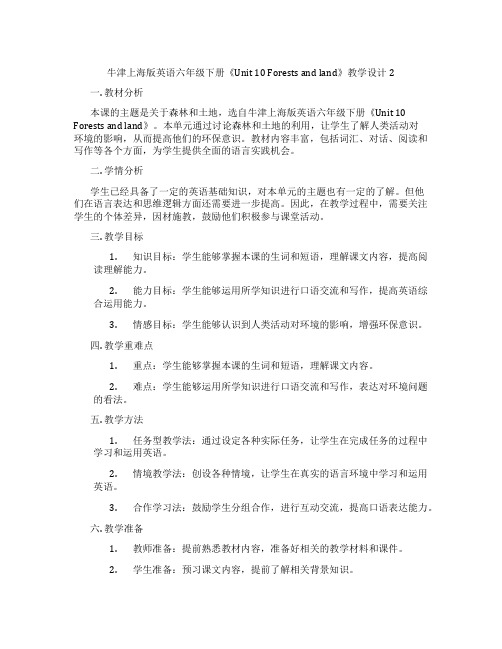
牛津上海版英语六年级下册《Unit 10 Forests and land》教学设计2一. 教材分析本课的主题是关于森林和土地,选自牛津上海版英语六年级下册《Unit 10 Forests and land》。
本单元通过讨论森林和土地的利用,让学生了解人类活动对环境的影响,从而提高他们的环保意识。
教材内容丰富,包括词汇、对话、阅读和写作等各个方面,为学生提供全面的语言实践机会。
二. 学情分析学生已经具备了一定的英语基础知识,对本单元的主题也有一定的了解。
但他们在语言表达和思维逻辑方面还需要进一步提高。
因此,在教学过程中,需要关注学生的个体差异,因材施教,鼓励他们积极参与课堂活动。
三. 教学目标1.知识目标:学生能够掌握本课的生词和短语,理解课文内容,提高阅读理解能力。
2.能力目标:学生能够运用所学知识进行口语交流和写作,提高英语综合运用能力。
3.情感目标:学生能够认识到人类活动对环境的影响,增强环保意识。
四. 教学重难点1.重点:学生能够掌握本课的生词和短语,理解课文内容。
2.难点:学生能够运用所学知识进行口语交流和写作,表达对环境问题的看法。
五. 教学方法1.任务型教学法:通过设定各种实际任务,让学生在完成任务的过程中学习和运用英语。
2.情境教学法:创设各种情境,让学生在真实的语言环境中学习和运用英语。
3.合作学习法:鼓励学生分组合作,进行互动交流,提高口语表达能力。
六. 教学准备1.教师准备:提前熟悉教材内容,准备好相关的教学材料和课件。
2.学生准备:预习课文内容,提前了解相关背景知识。
七. 教学过程1.导入(5分钟)教师通过展示图片或视频,引导学生谈论关于森林和土地的话题,激发学生的兴趣和思考。
2.呈现(10分钟)教师展示课文标题和图片,引导学生预测课文内容。
然后逐段呈现课文,让学生听读并回答相关问题。
3.操练(15分钟)教师设计各种口语练习,让学生分组进行角色扮演、讨论等,巩固所学知识。
- 1、下载文档前请自行甄别文档内容的完整性,平台不提供额外的编辑、内容补充、找答案等附加服务。
- 2、"仅部分预览"的文档,不可在线预览部分如存在完整性等问题,可反馈申请退款(可完整预览的文档不适用该条件!)。
- 3、如文档侵犯您的权益,请联系客服反馈,我们会尽快为您处理(人工客服工作时间:9:00-18:30)。
Unit 10 Forests and land
(一)知识与技能
1掌握形容物质的一些形容词,如woollen, wooden…
2熟练掌握We get…from…句型。
如We get wool from sheep.
3能区分use…to…和use…for的不同用法,会应用…is used to…和…is used for…。
如We use wood to make paper.
We use wood for making paper.
Wood is used to make paper.
Wood is used for making paper.
4掌握I’d prefer…的用法
(二)过程与方法
1 本课中出现了较多的We get…from…句型。
如We get wood from trees. / We get cotton from plants.等。
这些句式在本册中首次出现。
因此,作为新教知识,,教师有必要在课堂教学中加以大量的机械性操练。
2 We use…to …/ We use…for…的用法在本课中大量出现,在课本中M2U4中也曾经出现We use …for _ing 句型。
如We use them for making tables.(P31) 。
而且该句型在Tommy Target 中以被动形式出现。
因此,要以旧带新,可以穿插各种不同的事物,设立不同语境,让学生进行操练,尤其是对其被动语态…is used to…/ …is used for…的操练。
3 It’s made of…的句型在本课中也是重点句型,在学生熟练掌握该句型后,建议增加It’s made from…的句型练习。
4 操练句型It’s made of / from…和I’d prefer…
(三)情感、态度、价值观
培养学生保护森林等自然资源的意识
Period 1
1教师通过展示一些图片,引入该课主题并介绍一些生单词(如shelter, hollow, fuels等)先教会学生拼读这些单词,具体的用法会在文章具体语境下教授。
2通过幻灯片把听力过程中需要回答的问题显示出来,给学生两分钟时间通读问题后播放听力。
问题如下:(针对文章第一段)
What is a forest?
Why are forest very important?
What do birds do in the trees?
Who build homes in the hollows of the trees?
What is food for them?
学生逐一回答完问题后,请2-3位学生把以上问题的答案串起来,组成一段文章,即P54课文第一段。
3课文第二和第三自然段作为阅读材料来分析。
请学生快速浏览文章,并回答一下问题。
(可以采取抢答的形式)
What do people use trees for?
Where do oil and coal come from?
What do we use land for?
Why do many animals die?
What must we stop doing?
学生回答完问题之后,再请2-3位学生根据问题把答案复述出来。
Homework;
Read the new words and phrases
Read the text
Period 2
Oral practice
Text
1. Learn: air, lift, breathe, survive, alive
2. Recording: follow ---listen --- repeat
3. Recite the poem and act it out.
4. Ask: How does a plane stay in the air
How does a balloon rise in the air
It rises on air.
5. Learn: handkerchief, corners, object. Do an experiment. Sts listen and follow. Pass one handkerchief, four pieces of string and the toy object to each group of four students.
6. Take the groups to an elevated area and allow them to throw their parachutes over the edge.
7. Ask: What happens The parachute rides on air.
Homework:
Read and recite the words and phrases and text.
Period 3
Oral practice
Text
1.根据课文内容,用适当的单词填空。
(课本P55)把学生分为两组,请这两个小组的代表将其答案分别写在黑板上,看哪一组写得又对又快,然后集体校对。
2.播放录音。
学生跟读。
3.(延伸部分)讨论如果森林遭到严重破坏会造成何种后果,可以参照课本P59 More oral practice.
4.通过观看几幅图片,如树木,棉花,黏土等,请学生回答"What can we get from forests and land? What else?”采取小组竞赛的形式,说出的最多的小组获胜.
5 接着又问"What can we use them to do?”要求学生必须用完整句作答,即"We use …to…”
6.转换句型用"use…for…”再操练一遍.
7.(拓展)问:What is cotton used to do?
答:Cotton is used to…
练习"be used to do”的句型.
Homework:
Read and recite
Period 4
Oral practice
Text
1操练句型We get…from…
We use…to / for…
对话操练时应运用课本56页上的句式。
2以游戏的方式学习学习物质材料的表达。
以"things which are made of wood”为例,请学生一人只能说出一种木制产品,依次说下去,说不出的就会被淘汰出局,最后得出冠军
3.巩固复习对物质材料的表达和运用。
搜集一些不同材质的物品,让学生闭上眼睛通过感知猜一猜。
并问一些问题,诸如"How does it feel?”“What is it made of?”“ What is it?”等等。
4.在Think and tick活动中,请同学们自己设计出一些既省钱又环保的东西在生日聚会中使用,一方面操练了句型"I’d prefer…”另一方面又提高了学生的节约和环保的意识。
Homework:
Read and recite the words and phrases and text.
NOTES: (单元教后记)
1 本单元中出现了较多的We get…from…句型。
如We get wood from trees. / We get cotton from plants.等。
这些句式在本册中首次出现。
因此,作为新教知识,,有必要在课堂教学中加以大量的机械性操练。
2 We use…to …/ We use…for…的用法在本课中大量出现,在课本中M2U4中也曾经出现We use …for _ing 句型。
如We use them for making tables.(P31) 。
而且该句型在Tommy Target 中以被动形式出现。
因此,要以旧带新,可以穿插各种不同的事物,设立不同语境,让学生进行操练,尤其是对其被动语态…is used to…/ …is used for…的操练。
3 It’s made of…的句型在本课中也是重点句型,在学生熟练掌握该句型后,须增加It’s made from…的句型练习。
4 操练句型It’s made of / from…和I’d prefer…同时培养学生保护森林等自然资源的意识。
